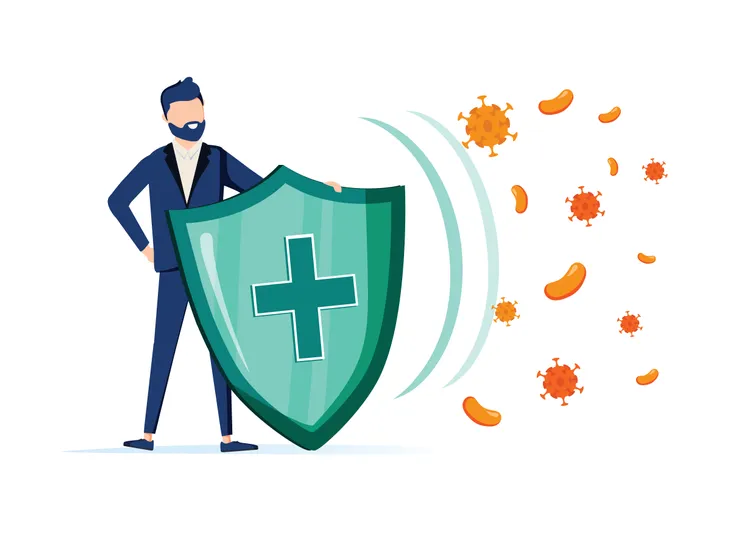- Your immune system plays an important role in protecting your body from harmful germs, substances, and cell changes that can make you sick.
- Certain everyday habits, such as chronic stress, eating a poor diet, not getting any exercise, and lack of sleep, may be suppressing your immune system.
- The best way to support your immune system is to live a healthy lifestyle. This includes staying active, eating a healthy diet, managing your stress, and adopting other healthy habits.
Your immune system is extremely important and plays a vital role in protecting your body from harmful germs, substances, and cell changes that can make you sick, says the National Center for Biotechnology Information (NCBI). Most of the time, you don’t even notice your immune system is there, especially when it’s running smoothly. That said, once your immunity is weakened or stops working properly, you’ll get ill. Since the immune system is so important, we must take care of it. It turns out, certain daily habits you might be doing right now may negatively impact your immune system.
Too Much Stress
Everyone deals with stress occasionally from busy work schedules, financial stress, busy schedules at home, and more. But the reality is, stress can take a serious toll on our health, including our immune system.
Individuals who experience chronic stress may be more susceptible to viral illnesses, such as the common cold or the flu. Healthline explains, “over time, stress hormones will weaken your immune system and reduce your body’s response to foreign invaders.”
The good news is that there are simple ways to manage daily stress, such as following a regular sleep routine, meditating, and engaging in regular exercise. If you need professional help, lean on your friends and family for support and reach out to your doctor.
Grief
Similar to stress, grief may also suppress your immune system. Dealing with the passing of a loved one can be incredibly traumatic, and some evidence says that if grief lasts for a long time, it may depress your body’s immunity, says WebMD. “The effect can linger for 6 months, but may go on longer if your grief is deep or doesn’t ease,” explains the source.
Dealing with grief is not easy, and everyone handles it differently. If you need help coping, talk to your doctor or mental health professional.
Not Getting Enough Sleep
Many underestimate the power of sleep. But the fact is, sleep is so important for your overall health. Sleep can help heal and repair your heart and blood vessels and help ward off diseases. It also plays a role in your immune system.
Healthline says a recent study showed “that quality sleep can bolster the T cells in your body that fight off infection.” When you get enough good quality sleep, it can help enhance the T cells to adhere to and destroy cells infected by viruses or germs. So, if you’re not getting enough sleep each night and you want to boost your immune system, it’s time to reassess your nighttime habits.
Lack of Exercise
Be honest with yourself, do you spend most of your day lounging on the couch or working at a desk? Do you avoid exercising because you just don’t have the time? If you answered yes, you may want to reevaluate how you view exercise.
Exercise is important for your overall health from keeping your joints healthy to delivering oxygen and essential nutrients to your tissues. It also can help support your immune system. WebMD says, “it helps blood get around your body more efficiently, which means germ-fighting substances get where they need to go.”
Lack of Vitamin D
You might already know that vitamin D plays a role in building and maintaining healthy bones but it also supports your immune system. Unfortunately, Healthline says it’s estimated that about 1 billion people worldwide have low levels of vitamin D and roughly 41.6-percent of U.S. adults are deficient.
The source says vitamin D “directly interacts with the cells that are responsible for fighting infection.” So if you think you might be deficient in this essential vitamin, contact your doctor for a blood test to confirm. Adding more of it to your diet is easy, too. You can get vitamin D from foods like fatty fish, eggs, and fortified foods such as milk and cereal.
Natural sunlight is also another easy way to get vitamin D. WebMD says 5 to 15-minutes of sunlight two to three times per week is a great way to increase your intake.
Staying Indoors Too Often
We already know that going outside to get vitamin D can benefit your immune system, but it turns out there are other benefits of spending time outside too. WebMD explains, “Many plants put substances, including organic compounds called phytoncides, into the air that seem to boost immune function.”
The source also notes that sunlight seems to energize specific cells in your immune system, known as T cells, which have an important job of helping fight infection. So turn off the TV and go spend some time outdoors to benefit your immune system!
A Diet Lacking Fruits and Veggies
Without fruits and vegetables, you can be more prone to vitamin deficiencies and certain ailments, such as constipation and diverticulosis. But that’s not all. A diet lacking fruits and veggies may also be suppressing your immune system.
Fruits and vegetables are chock-full of essential nutrients such as beta-carotene, vitamin A, vitamin C, and vitamin E, which all play a role in boosting immune function. These foods are also a great source of fiber, which can help lower your body fat percentage and strengthen your immune response, says WebMD.
High-Fat Diet
Other unhealthy eating habits, such as consuming a high-fat diet, especially high in saturated fats, may also suppress your immune system. Healthline explains, “high saturated fat intake can activate certain signaling pathways that induce inflammation, thus inhibiting immune function.” Consuming too many saturated fats may also increase your risk of infection by depressing your immune system and white blood cell function.
Furthermore, the source points out, rodent studies suggest that high-fat diets can cause gut bacteria changes and damage the intestinal lining. This is a problem because this may increase the risk of infection and disease. To support your immune system, lean on a balanced diet rich in fiber and choose healthy fat sources, such as avocados and fatty fish.
High Sugar Diet
There’s no denying that sugar tastes good but consuming too much sugar regularly can be bad for your health. Healthline explains foods high in added sugars “increase the production of inflammatory proteins like tumor necrosis alpha (TNF-α), C-reactive protein (CRP), and interleukin-6 (IL-6), all of which negatively affect immune function.”
The source also notes that high blood sugar levels may harm gut barrier function, which can cause gut bacteria imbalances. In turn, this can alter your immune response and put you at risk for infection.
Smoking
In case you need another reason to quit, add suppressing immune function to the list! The Centers for Disease Control and Prevention (CDC) says, “smoking is known to compromise the equilibrium, or balance, of the immune system.” This can increase your risk for several immune and autoimmune disorders. The source also notes there is new evidence that suggests smoking is a cause of rheumatoid arthritis (an autoimmune disease).
With this in mind, if you smoke, it’s time to quit. However, we do understand that it’s easier said than done. If you need help quitting, reach out to your doctor. Your doctor will be able to recommend a treatment plan and may direct you to a support group you can lean on for extra help.
Drinking Too Much Alcohol
Having a glass of wine or a beer with friends every once in a while might be fine, but drinking too much alcohol regularly can suppress your immune system. Healthline says alcohol makes it harder for your immune system to defend the body against harmful germs.
Alcohol can cause adverse effects throughout the body. The source says, “In the lungs, for example, alcohol damages the immune cells and fine hairs that have the important job of clearing pathogens out of our airway.” Alcohol can also trigger inflammation in the gut and harm the microorganisms that maintain immune system health. If you drink alcohol, be sure to drink it in moderation.
 Shutterstock/Africa Studio
Shutterstock/Africa StudioTips to Support Your Immune System
The best way to support your immune system is to live a healthy lifestyle. This includes staying active, eating a healthy diet rich in fiber and essential vitamins and nutrients, and staying away from high fat, processed foods as well as sugary foods.
Managing your daily stress, spending more time outdoors, washing your hands regularly, and getting enough sleep can also support your immune system. Quitting bad habits like smoking and excessive alcohol consumption is also a great way to help immunity.














